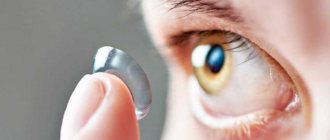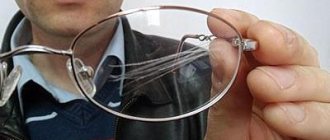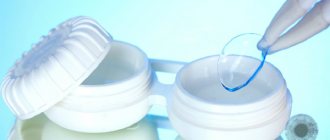In this article we will look at how to properly wear daily and disposable lenses.
Lenses have become very popular among people with poor vision (by the way, not only, because colored lenses are no less in demand). And this is not surprising - they are much more convenient than glasses (although the latter add some zest to the image).
But the procedure for putting on and removing lenses requires some skills and a certain amount of time. And sometimes small difficulties arise with the last factor when you come in the evening exhausted after work. Therefore, let's delve into the topic in more detail - is it possible to sleep in lenses, and what the consequences may be.
Is sleeping in contact lenses harmful?
Sleeping in contact lenses can lead to serious consequences. If ophthalmic products are not removed, the cornea does not receive proper nutrition, and inflammation and swelling occur. The development of diseases in the future cannot be ruled out. Therefore, it is recommended to place products intended to correct vision in a container with a solution, and not leave it on the mucous membranes.
To understand exactly why you can’t sleep in lenses, it’s worth considering the most common complications that arise if you neglect a simple rule:
- Conjunctivitis. Often occurs due to prolonged wear of products. This is due to irritation of the mucous membranes, their drying out and the addition of a bacterial or viral infection. To eliminate the problem, you need to consult a doctor and temporarily switch to wearing glasses.
- Vascular disorders. Small arteries begin to grow into the cornea. It becomes cloudy and vision deteriorates.
- Keratitis. An inflammatory process begins inside the cornea, fraught with serious complications. To eliminate the problem, it is often necessary to resort to surgery.
- Ulcers. Occurs when infection occurs.
- Allergic reaction. Observed when wearing lenses for a long time.
It is important to know! Products intended for vision correction are made from materials that allow oxygen to pass through. True, the cornea must be in its natural environment. If the eyelids are closed, oxygen access is difficult.
If you don't remove your lenses before going to bed
When using daytime lenses while sleeping, there is a risk of complications.
The most common:
- corneal hypoxia – a violation of oxygen access, which subsequently causes infectious-inflammatory, degenerative diseases of the organs of vision;
- redness, swelling of the conjunctiva, irritation;
- “dry” eye syndrome, in which there are complaints of pain, redness of the sclera, dryness and discomfort, increased sensitivity to bright light;
- allergic manifestations;
- infectious and inflammatory processes due to protein and fatty deposits accumulated on the lenses (conjunctivitis, ulcerative keratitis);
- bacterial and viral eye diseases;
- impaired blood supply, which leads to vascular disorders, corneal clouding, and loss of vision.
During daytime sleep, redness, irritation, allergic reactions, and dryness may occur.
A terrible consequence of constantly sleeping in lenses not intended for this purpose is deterioration of vision.
Improper use causes harm not only to the human body. The appearance of the product and its properties deteriorate, and its performance changes.
Is it possible to sleep with contact lenses at night?
There is no consensus on whether it is possible to sleep at night wearing contact lenses. They are made from different materials, differing from each other in hydrophilicity and oxygen permeability. Accordingly, their wearing mode is different.
Most models can be worn for 12 to 14 hours. True, only during the day. Many people mistakenly believe that such optics can be left on at night. After all, the period of night rest does not exceed the specified time frame. In fact, you still need to remove them. The same applies to one-day events.
Is it permissible to keep it and what models are allowed?
There are also models that can be safely left overnight without worrying about whether they had to be removed or not, and what will happen after. They are often called “night” or “corrective”. Their uniqueness is that they should be inserted at night and taken out in the morning. And your vision will remain perfectly clear. Typically, such lenses have a two-week period of use. Experts consider Acuvue Oasis the best lenses for night use.
They have high oxygen permeability, which helps eliminate eye irritation. If it comes to daytime sleep, then everything is not so strict, although there are rules. In the early hours, a short sleep of 1-2 hours is permissible, in daytime lenses for short or extended wear. However, after waking up you will need to use moisturizing eye drops.
Is it possible to sleep in lenses for a couple of hours during the day, what will happen?
Speaking about whether it is possible to sleep for a short time during the day wearing contact lenses, it is worth noting that such actions are not strictly prohibited. A short rest is allowed and does not lead to any complications. True, only if you use one-day options.
Rest should last a maximum of three hours. In addition, it is recommended to use special drops to moisturize the cornea so that the mucous membranes do not dry out.
Is it possible to sleep in colored contact lenses without consequences?
Let's consider another question: if the lenses are colored, is it possible to sleep in them?
You can't do this. Such products do not allow oxygen to pass through well. They can be worn no more than 8 hours a day.
These lenses perform an aesthetic function. Sleeping in lenses at night and during the day is pointless and harmful. These optics must be used with caution. Only daytime wear is allowed.
colored contact lenses
If liquid is not at hand, you can place the lenses in water
Your eyes will become very dry overnight if you do not remove your lenses at night, and in the morning they will be very red. It is sometimes very difficult to remove them from a dry cornea; everything must be done as carefully as possible. Before removing the lenses, you need to moisten your eyes with drops or solution.
To make the lenses softer, apply drops to your eyes. After you wake up with your lenses on, it may seem like you can see much worse than before. But this is only for a few hours. If you forgot to take off your lenses at night or didn’t have the opportunity, be sure to consult a doctor to make sure everything is okay with your eyes. Give your eyes a break from lenses for a while.
After a night spent wearing lenses, the eyes need a qualified examination.
Doctors' opinion
Doctors say that people sleeping in lenses are harmful to their own health. They explain why this cannot be done. This is fraught with the following consequences:
- swelling, causing erosion;
- penetration of infection;
- rubbing the cornea.
It is important to know! If you do not remove contact lenses before going to bed, the mucous membranes become rough. As a result, the risk of developing eye diseases increases. A significant deterioration in vision is possible.
Useful video
This video shows the consequences of sleeping in lenses, the worst of which is blindness. The latest research is presented.
You can sleep in CL only in cases where it is specified in the instructions. However, there is always the possibility of individual intolerance and an allergic reaction.
Author's rating
Author of the article
Alexandrova O.M.
Articles written
2031
about the author
Was the article helpful?
Rate the material on a five-point scale!
( 2 ratings, average: 3.00 out of 5)
If you have any questions or want to share your opinion or experience, write a comment below.
What types of contact lenses are there?
There are several types of ophthalmic products. Each species has a number of characteristics. Naturally, the period of wearing them also differs.
Orthokeratology lenses
Most often used to correct myopia. It is recommended to wear such products at night. They are believed to have a positive effect on the cornea. It is given the correct anatomical shape.
effect on the cornea of an oratoceramic lens
Cidrole contact lenses
They are characterized by a high level of humidity, preventing drying out of the mucous membranes. They can be worn for a long time. True, you still need to remove such products at night to avoid negative consequences.
Silicone hydrol contact lenses
Best of all, other species allow oxygen to pass through. The contact optics are quite dense and designed for long-term wear. These lenses can be left in place for 24 hours. There will be no harm from them. The main thing is not to abuse this, try to sleep in ophthalmic products only in exceptional cases.
silicone hydrolic contact lenses
What to do if complications arise from wearing lenses
If any negative changes occur, you should not self-medicate. In case of complications, you need to seek help from an ophthalmologist. Such actions should be performed even if there is slight redness or dryness of the mucous membranes.
Only a doctor can identify the true cause of unpleasant symptoms and prescribe a course of treatment.
Recommendations for correct wearing
Simple recommendations will help minimize the risk of negative changes:
- Carefully inspect the products before use. They should not have chips, scratches, any other damage or debris.
- Put on and take off the optics with clean hands.
- The products are not used for conjunctivitis, colds, or inflammatory processes in the organs of vision.
- For storing and processing optics, use only fresh solution. Do not immerse it in previously used liquid.
After removing the products, it is recommended to do short exercises for the eyes. You should also avoid wearing them for too long. The maximum period of operation is indicated on the packaging. You should familiarize yourself with this information in advance. It would also be a good idea to consult an ophthalmologist. The doctor will give recommendations related to the use of optics and help avoid possible consequences.
Recommendations
There are several basic rules that will help avoid complications. The most important of these is cleanliness.
Before putting on or removing eye devices, you should wash your hands thoroughly with soap and water.
Hands should be dried with a towel that does not leave fibers. This will help avoid getting them in your eyes.
You should install contact lenses before applying makeup, and close your eyelids when using hairspray. It is recommended to start installing them from the right eye.
It is necessary to ensure that there are no cracks, scratches or tears on the devices. If you need to rinse before installation, use only fresh solution.
You should not sleep in daily contact lenses or wear them if you have eye inflammation, flu, acute respiratory infections or diabetes. Tobacco smoke and hairspray significantly reduce their lifespan.











